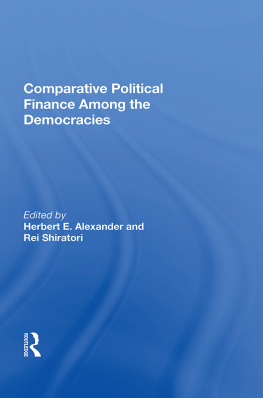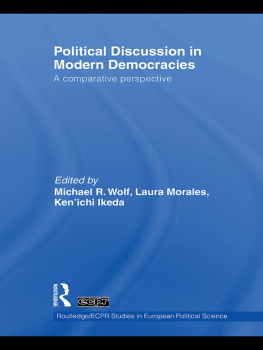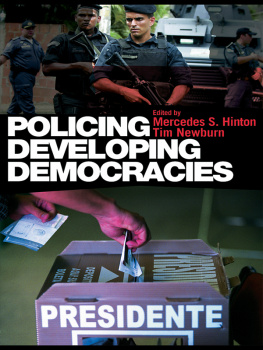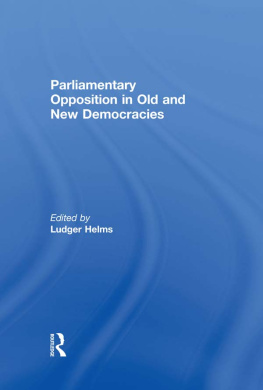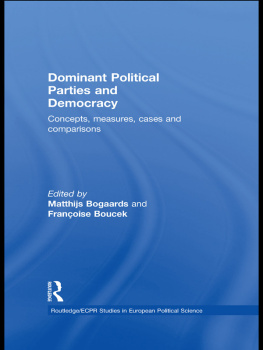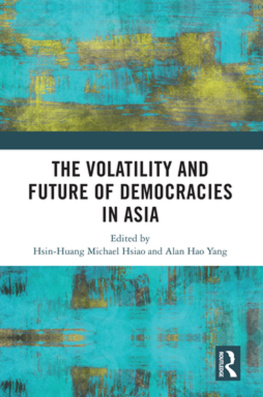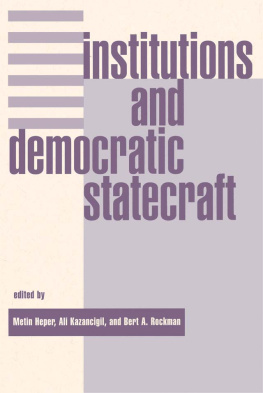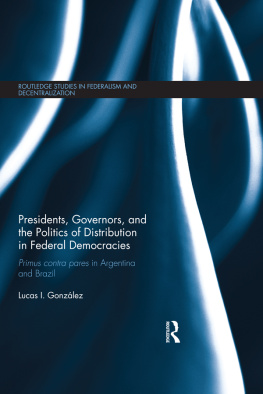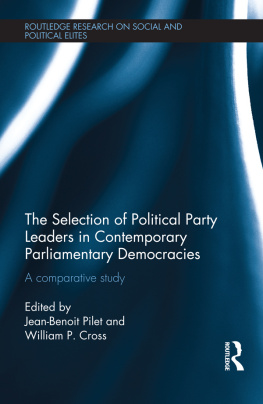First published 1994 by Westview Press
Published 2018 by Routledge
52 Vanderbilt Avenue, New York, NY 10017
2 Park Square, Milton Park, Abingdon, Oxon OX14 4RN
Routledge is an imprint of the Taylor & Francis Group, an informa business
Copyright 1994 by Taylor & Francis
All rights reserved. No part of this book may be reprinted or reproduced or utilised in any form or by any electronic, mechanical, or other means, now known or hereafter invented, including photocopying and recording, or in any information storage or retrieval system, without p ermission in writing fromthe publishers.
Notice:
Product or corporate names may be trademarks or registered trademarks, and are used only for identification and explanation without intent to infringe.
Library of Congress Cataloging-in-Publication Data
Alexander, Herbert E.
Comparative political finance among the democracies / edited by
Herbert E. Alexander and Rei Shiratori
p. cm.
Includes bibliographical references and index.
ISBN 0-8133-8852-X
1. Campaign fundsCrosscultural studies. 2. Political parties
Cross-cultural studies. I. Shiratori, Rei, 1937 . II. Title.
JF2112.C28A44 1994
324.78dc20
9429257
CIP
ISBN 13: 978-0-367-01681-4 (hbk)
This book is the second in a comparative politics series initiated by the Citizens Research Foundation on behalf of the Research Committee on Political Finance and Political Corruption, an affiliate of the International Political Science Association. This collection of articles on aspects of the financing of politics and regulatory systems in thirteen countries took root at a conference organized by Rei Shiratori and held in Tokyo, Japan in September, 1989. The Tokyo Roundtable, entitled Theories and Practices of Political Finance and Election Administration, was jointly sponsored by the Institute for Political Studies in Japan and the Research Committee. The book includes updated chapters selected from among the Tokyo conference papers; chapters on Brazil, France, Korea, and Germany were added subsequently, as were the introductory chapter by Herbert E. Alexander and Rei Shiratori, and the chapter on Canada and the United States by Karl-Heinz Nassmacher.
In recent years, there has been an increase in the number of scandals related to political financing, even leading to governmental crises in countries such as Italy and Japan. Governments have sought to respond by enacting new laws to regulate or to alter their national systems of political finance. Among the reforms are laws governing disclosure or transparency, expenditure and contribution limitations, as well as direct and indirect forms of public subsidies to political parties, candidates, and related organizations, such as party foundations; some of these topics were the subject of recommendations made in a Tokyo Declaration proposed at the Tokyo Roundtable, as noted in the introductory chapter.
This collection of essays not only consists of case studies of various countries, but presents several country-by-country comparisons and a conceptual framework that enables the reader to understand the context and implications of funding sources, campaign expenditures, and regulatory systems. Among the specific themes discussed are: the effects of public money on political systems, the roles of public funding in comparative perspective, the relative merits of direct and indirect public funding, the participation, partisan alignments on the issue of public financing, campaign costs, the unanticipated consequences of legislative responses to campaign funding abuses and calls for political finance reform, the ambiguous interrelationships of local and national political financing, and the relationships of viable and stable (or lack thereof) political systems to political financing and public funding.
While political finance in its widest application is its prevailing theme, this book emphasizes the particular roles of forms of public assistance as an underlying issue. Of the thirteen countries studied, the roles of each nations system of public assistance is dealt with by the analysts. The book embraces countries with presidential as well as parliamentary systems, and with both strong and weak party systems. Particularly important in this regard are the chapters dealing with the Asian countries of Japan, India, and Korea, where the questions of political financing as well as public assistance have heretofore been only rudimentarily examined.
Scholarship regarding political finance and election reform in individual countries, and on a comparative basis, has been nurtured by the Research Committee, chaired by Herbert E. Alexander.
As recently as thirty years ago, only a handful of scholars had turned their attention to the study of political funding, of how election campaigns were financed and what the influence of money meant. The activities of these few academics stirred scholarly awareness, but often it was events and actions outside academic halls that brought the matter into public view, as suggested in the introductory chapter.
In recent years, popular interest in political finance has grown exponentially among academics, legislators, the media, and the general public. A sizable number of political scientists now turn their attention to the role of money in politics; organizations have been established to monitor, from various perspectives, the questions of political financing; newsletters have developed, devoted entirely to the subject; and the regulation of political money is now among the most important items on the legislative agenda in many countries.
The interrelations of money and politics have gained attention, not only in the popular sphere, but within the academic community as well. This book highlights sophisticated analytical and expository treatment of the subject among scholars. As a collection of essays by pre-eminent political scientists in the United States, the United Kingdom, Europe, and Asia, it is an in-depth exploration of political finances in and among mature and developing democracies of the world. In addition, the essays in this book project the problems of political financing into the twenty-first century.
The literature on comparative political finance is relatively thin. There are currently a limited number of comparative political finance volumes published in the English language: Comparative Political Finance: A Symposium, edited by Richard Rose and Arnold J. Heidenheimer as a special issue of the Journal of Politics (Gainsville, Florida: University of Florida, 1963); Arnold J. Heidenheimer, (ed.), Comparative Political Finance: The Financing of Party Organizations and Election Campaigns (Lexington, Massachusetts: D. C. Heath and Company, 1970); Herbert E. Alexander (ed.), Comparative Political Finance in the 1980s (Cambridge: Cambridge University Press, 1989); Matti Wiberg (ed.), The Public Purse and Political Parties: Public Financing of Political Parties in Nordic Countries (Jyvaskyla, Finland: The Finnish Political Science Association, 1991); and Arthur B. Gunlicks (ed.), Campaign and Party Finance in North America and Western Europe (Boulder, Colorado: Westview Press, 1992). The Congressional Research Service of the Library of Congress, Law Library, has published a series of country-by-country analyses, the latest being Campaign Financing of National Elections in Fomgn Countries (Washington, D.C.: Library of Congress, 1991); various publications of the Canadian Royal Commission on Electoral Reform and Party Financing have articles with references to other countries, see especially F. Leslie Seidle, Comparative Issues in Party and Election Finance, Vol. 4 of the Research Studies (Toronto: Dundum Press, 1991); a compendium of brief overviews of regulatory patterns in twenty countries is contained in The World of Campaign Finance: A Reads Guide to the Funding of International Elections, published by the Center for a Democracy and the Center for Responsive Politics (Washington, D.C.: 1993). The present volume seeks to address political finance matters in certain countries included in the above-mentioned books, but adding a dimension by including chapters on Brazil, India, Japan, and South Korea.

